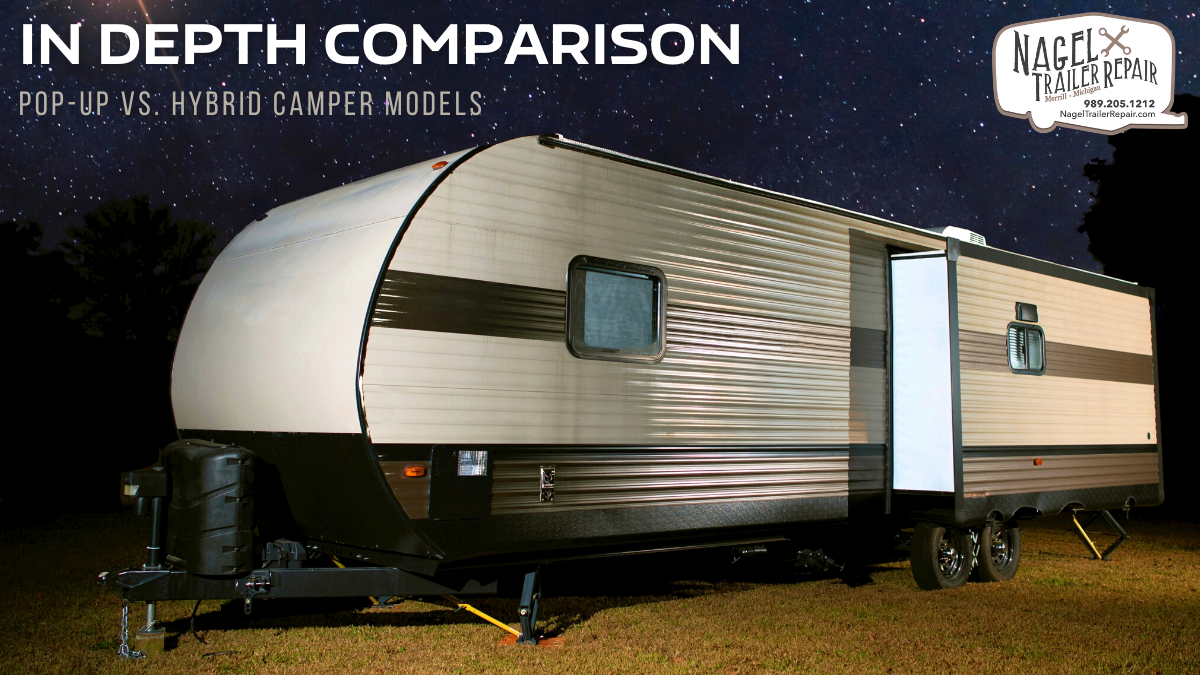Choosing the ideal camper for your outdoor adventures involves weighing various options. Among the considerations, the debate between pop-up and hybrid camper models often arises. Each design offers unique benefits, catering to different camping preferences and needs. To navigate this choice effectively, it’s essential to understand the key differences between these two types of campers.
Pop-Up Campers:
Pop-up campers, also known as folding or tent trailers, are characterized by their collapsible structure. They typically feature a low-profile design when transported but expand to offer a comfortable living space when set up. These campers often include fold-out beds, a small kitchenette, and a dining area. They are lightweight, making them easier to tow and maneuver on various terrains.
Advantages:
- Compact and Lightweight: Pop-up campers are known for their compact size and reduced weight, making them suitable for smaller vehicles and easier to tow.
- Affordability: Generally more affordable than other camper types, making them an attractive option for budget-conscious campers.
- Outdoor Experience: With large mesh windows and the canvas tent-like structure, pop-up campers provide a closer connection to the outdoors, allowing for better airflow and a sense of being immersed in nature.
Limitations:
- Limited Amenities: While equipped with basic amenities, pop-up campers often lack the full range of facilities found in larger campers or RVs.
- Weather Sensitivity: Their canvas walls may be less insulated, making them more susceptible to temperature changes and less suitable for extreme weather conditions.
- Setup Time: Setting up a pop-up camper can take longer compared to some other camper types due to the process of expanding and securing the tent-like structure.
Hybrid Campers:
Hybrid campers, on the other hand, combine elements of traditional travel trailers with pop-up camper features. They typically feature hard-sided walls and a pop-out tent section, offering a blend of comfort and versatility. Hybrid campers often come with amenities like kitchens, bathrooms, and sleeping areas that cater to a broader range of camping preferences.
Advantages:
- Versatility: Hybrid campers offer a more spacious interior compared to pop-up campers while maintaining a lighter weight and easier towing than some larger RVs.
- Comfort and Amenities: These campers often provide a range of amenities, including bathrooms, kitchens, and ample sleeping spaces, providing a more comfortable camping experience.
- Weather Resistance: With their hard-sided walls, hybrid campers typically offer better insulation and weather resistance, making them suitable for various climates.
Limitations:
- Cost: Hybrid campers might be more expensive than pop-up campers due to their additional amenities and features.
- Maintenance: The hybrid design might require more maintenance due to the combination of hard and soft sides, potentially needing extra care for the pop-out tent sections.
- Weight and Size: While lighter than many RVs, hybrid campers might still be heavier and larger than some pop-up models, impacting fuel efficiency and maneuverability.
Conclusion:
In summary, , the choice between pop-up and hybrid camper models hinges on individual preferences and camping needs. Pop-up campers, with their lightweight design and budget-friendly nature, are ideal for those seeking a closer connection to the outdoors. On the other hand, hybrid campers strike a balance between comfort and versatility, offering a more spacious and amenity-rich camping experience. Whether opting for the simplicity of a pop-up or the added comforts of a hybrid, both models cater to diverse camping enthusiasts. For those who seeking camper upgrades in Michigan, the decision rests on factors like budget, desired amenities, and the type of outdoor adventures awaiting exploration. With options to suit varying lifestyles, camper enthusiasts in Michigan can embark on their next adventure with confidence, knowing they have chosen the model that best aligns with their camping aspirations and the scenic landscapes of the Great Lakes State.


